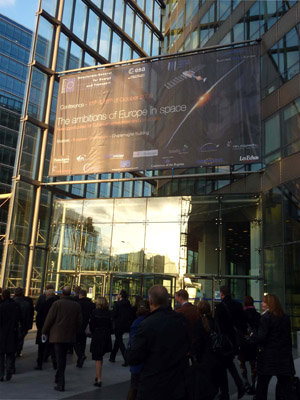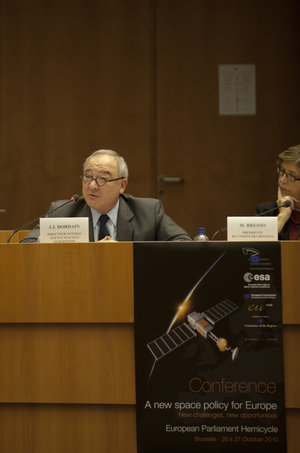'A new space policy for Europe' at the European Parliament
“Space represents our future”. “Europe could become world leader in a certain number of domains that use space.” These were some of the statements made by top-level European leaders at the conference held at the European Parliament’s hemicycle on 26-27 October under the theme 'A new space policy for Europe'.
The focal point of the different debates was the new dimension that the Lisbon Treaty, which entered into force on 1 December 2009, provides for the European Space Policy and for Europe’s ambitions in the exploitation and exploration of space.

The conference highlighted the many opportunities space offers as a tool in European policy development and as a value-adder to stakeholders in industry and civil society.
“There is no competitiveness without Research and Innovation. Space is a domain where innovation is the engine. We must reinforce investments in space”, declared Antonio Tajani, Vice-President of the European Commission, who also stressed that “Space Policy is not only about satellites and launchers, but is also about providing concrete answers to the needs of European citizens.” He also declared that “Space represents our future”.
Herman Van Rompuy, President of the European Council, emphasised the political and strategic dimension of space for Europe: “We must promote Europe as a space power. To achieve this, we must build on the experience of ESA,” explained Mr Van Rompuy. “ESA should be reinforced in order to obtain full responsibility for the implementation of the Space missions that Europe’s status of world power requires.”
Jean-Jacques Dordain, Director General of ESA, highlighted the importance of the Lisbon Treaty for space, for Europe and for ESA. Mr. Dordain recalled that “thanks to its Member States, Europe is leader in space science and technology and the European space industry and operators are among the most competitive of the world”. He also stressed that “the new competences of the European Union in space should allow Europe to be stronger in the world and to become world leader, through the relevant EU policies, in a number of domains that use space (environment, climate change, management of natural or man-made disasters, maritime surveillance, air traffic control, aid to development, security)” .“We must work all together towards achieving this”, concluded Mr. Dordain.
ESA and the EU have been working together closely for many years, notably on flagship programmes covering statellite navigation like Galileo and EGNOS, and on the Earth Observation programme, GMES (Global Monitoring for Environment and Security).
The event in Brussels was co-organised by the Sky and Space Intergroup of the European Parliament and Business Bridge Europe, and included an impressive roster of actors in European space policy from the European Union, the Member States and industry. Vittori Prodi, member of the European Parliament and Chairman of the “Sky and Space” intergroup declared that: “The US spends in space the equivalent of six times the combined budget of EU countries. Only by working together can we maximise the collective impact of Europe”.
By participating actively in the different panel discussions, Members of the European Parliament demonstrated their shared vision on the importance of the space sector for the future of Europe. When closing the Conference, Sabine Laruelle, Belgian Minister in charge of Science Policy and representative of the Belgian Presidency of the European Union concluded: “The Lisbon Treaty gives increased competences to the European Union on Space Policy. I express the wish that the three institutions, the European Commission, the Council and the European Parliament fully embrace the new competences and move the European Space programme forward.”








